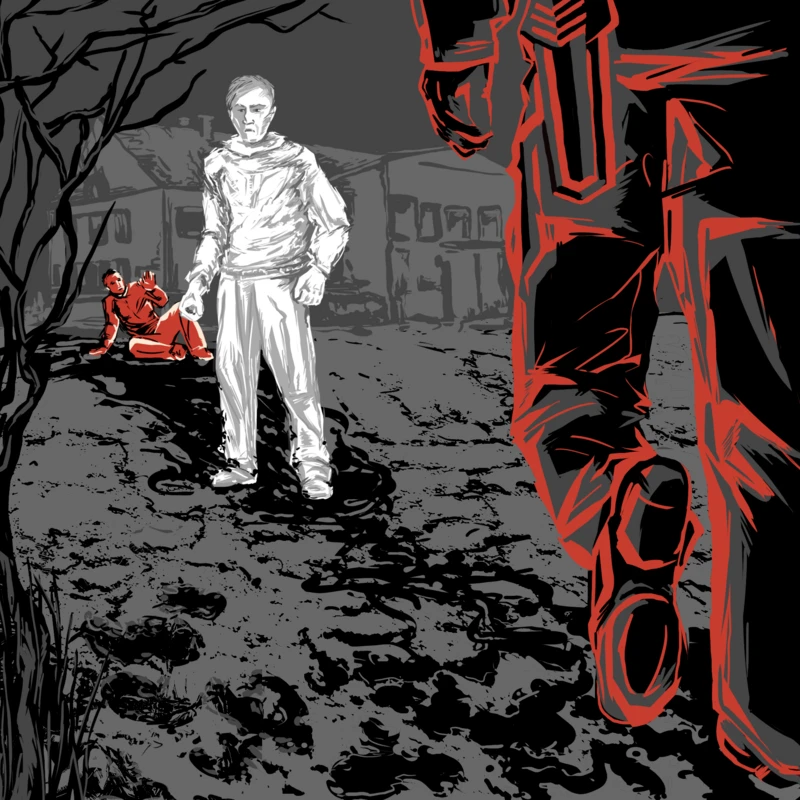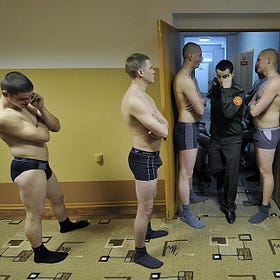Russia's runaway soldiers
Court records and social media chat groups show record numbers of Russian soldiers are being prosecuted for desertion, many are being helped and hidden by their families.
By Nina Nazarova.
Russian courts have heard a record number of cases this year of soldiers deserting their units or failing to return home from leave. Many take refuge with relatives who can also face prosecution. Chat groups on social media are now full of stories of soldiers on the run and the families who help them. They offer a unique insight into the price many ordinary Russian families are paying for Putin’s war in Ukraine.
On the morning of 23 March 2023, in a village in Stavropol region in southern Russia, a young man called Dmitry Seliginenko gave his girlfriend a lift on his motorbike to pay her bills at the local authority offices.
Six months earlier Seliginenko had been called up to fight in Ukraine, as part of Putin’s September 2022 mobilisation drive. He was one of 90 young men conscripted from the village - which has a population of just 2500.
By March 2023 Seliginenko should have been back at the front, but he had failed to return from ten days medical leave and was now on the wanted list.
On his way through the village he was spotted by a former classmate Andrei Sovershennov, who had joined the police after finishing school.
Sovershennov, was on duty that day, and knew about the wanted notice. He called the military police and as Seliginenko waited for his girlfriend, the three men attempted to arrest him.
Seliginenko somehow managed to alert his mother and stepfather and they drove to the village centre to try to intervene. There are two different versions of what happened next.
In the official police version, Seliginenko’s stepfather, Aleksandr Grachov grabbed Sovershennov’s handcuffs, shouting ‘arrest me instead’, and then pushed him to the ground and started beating him up.
In the family’s version, it was Grachov who was pushed to the ground and beaten after demanding to see an arrest warrant for his stepson.
Whatever the truth, both men ended up in hospital, and Grachov was subsequently charged with assaulting a policeman.
Seliginenko meanwhile, jumped into his parents car and drove off.
In the village chat group on the Russian social media channel, VKontakte, the case was avidly discussed. Seliginenko’s family aired their grievances about the way their son had been treated and tried to explain why they’d tried to stop him being sent back to the frontline.
They said that from the moment Dmitry had been mobilised, the military authorities had failed to follow the correct procedures. He wasn’t given a medical examination to see if he was fit for service, and was sent to the frontline despite testing positive for coronavirus.
This is a common complaint from soldiers and their families - as BBC Russian has seen in numerous similar court cases.
By January 2023 Seliginenko was suffering from frostbite and was given leave to recover. Two days after he arrived home he had to have a gastric surgery (probably appendicitis). The family argued that he was clearly unfit for military service, and should have seen by a military medical commission.
Not everyone in the chat group was sympathetic to their arguments, and in response the family posted this emotional appeal to their neighbours.
“Here you are living comfortably in our village, but which of you will come with us to a hospital in Pyatigorsk, Budyonnovsk or Rostov to see how many wounded soldiers are lying there? … Before you judge others, put yourselves in the place of the mother and son who’ve suffered so much already…You’ve got your husbands and sons beside you; you’d better pray that the same thing doesn’t happen to you!”
In March 2024 Aleksandr Grachov’s case came to court, he was found guilty of assault and fined 150 thousand roubles.
Dmitry Seliginenko has not returned to his military unit and his current whereabouts are unknown.
None of those involved wanted to speak to the BBC.
Villages stripped bare of men
As Aleksandr Grachov was appearing in court in Stavropol region, hundreds of miles away in Buryatia on the other side of Russia, two other cases were being heard.
In the dock were a soldier, Vitaly Petrov, who had deserted from his unit, and his mother- in-law, Lidiya Tsaregorodtseva, who had tried to prevent local police from arresting him.
The BBC has pieced together what happened from court documents, and from the testimony of people familiar with the case, but who we are not naming for security reasons.
Vitaly Petrov, a 33 year old father of two from the village of Sharalday, was called up to fight in Ukraine in 2022.
He was one of thousands of young men from Buryatia who have either volunteered or been mobilised to take part in Putin’s ‘special military operation’. The region is one of Russia’s poorest. In the autumn of 2022 it had one of the highest mobilisation rates in the country, and it also has one of the highest casualty rates.
All the men have been taken away from us in the villages, there’s no one left to do the hard work, to look after the animals, and prepare for winter.
An ongoing study by BBC Russian and the independent Russian news outlet Mediazona has confirmed the deaths of nearly 1900 men from Buryatia in the war in Ukraine, since February 2022. When compared to the overall male population of fighting age, that’s the second highest casualty rate of any region in Russia. Our research has shown that soldiers from Buryatia are 33 times more likely to be killed in action than their peers from Moscow.
In June 2023 Vitaly Petrov ran away from a military hospital where he was sent after previously going absent without leave and being forcibly returned to his unit earlier the same year.
His mother-in-law says he was unfit for service and suffering from headaches, and she also told the court he had been subject to violence and extortion in his military unit.
Military prosecutors say he was simply trying to avoid being sent back to the frontline.
Throughout the summer and autumn of 2023 Petrov had been hiding at his mother-in -law’s house. He spent most of his days in the nearby forest, foraging for pine nuts, mushrooms and berries, coming home from time to time at night to sleep.
It’s a familiar picture, says activist Grigory Sverdlin, whose Run to the Forest NGO helps soldiers who’ve deserted to flee Russia. He estimates that about 30 per cent of deserters stay inside the country (the rest go abroad). According to Mediazona, there were more than 13 thousand cases in Russian courts involving charges of desertion and going AWOL.
In December 2023 Petrov’s luck finally ran out, and armed police turned up at the house at night to arrest Petrov.
As in Dmitri Seliginenko’s cases, the police and family accounts of what happened next, are very different.
Lidia Tsaregorodtseva says the police broke down the door and burst into the house, pushing her and her two terrified young grand-daughters aside as they began searching the house and pulling up the floorboards with an axe.
She also says that the police failed to show her either ID or a warrant.
The police— according to court documents, denied that they had failed to show a warrant or ID, and they also said they had not searched the place or moved anything.
Everyone agrees that Petrov emerged from his hiding place in the cellar and his daughters ran to him. Lidia Tsaregorodtseva says that a policeman roughly pushed one of the girls away, causing her to hit her head on the corner of a cupboard. She also says that the police grabbed her by her hair and punched her in the chest.
The police say Tsaregorodtseva then grabbed a knife and told them that she’d already spent 16 years in prison for murder. There’s no record of this, but Tsaregorodtseva did have previous convictions for violent behaviour and for wasting police time.
The police say that as the lead criminal investigator - Bair Radnayev, tried to grab the knife from Lidia’s hands, she threw boiling water in his face.
She denies brandishing a knife and says she had been boiling up feed for the pigs, and that in the struggle someone tripped over the electric cable, knocking the kettle off the top of the microwave and covering Radnayev in boiling water.
Petrov was dragged out of the house, and according to his young daughters, beaten with a stun gun by the police. Radnayev was taken to hospital with burns.
Both Petrov and Tsaregorodtseva were prosecuted. He was sentenced to six years in prison for being absent without permission. She got two years in jail and was ordered to pay 100,000 roubles (roughly 800 GPD) in compensation to Radnayev.
A person with knowledge of the case who spoke to the BBC said Vitaly Petrov’s wife is relieved that her husband is in prison and not back at the frontline.
“‘Now that they’ve sent her mum down, she’s been left on her own to cope with all of this. What would I do with an invalid on top of all that, she says.”
The BBC source went on to describe the toll the war was taking in rural areas.
“All the men have been taken away from us in the villages, there’s no one left to do the hard work, to look after the animals, and prepare for winter. One child’s ill, the other’s been scared to death. If you’ll forgive me for saying so, in the villages it’s just the women whistling in the wind.”
The source said many local men felt they were in ‘an impossible situation’ - sent to war whether they wanted to or not, while their families were left to struggle on at home. Was there sympathy for the plight many men and their families now found themselves in, the BBC asked. The reply was stark:
“Nowadays, the courts couldn’t give a toss about any of this.”
Seven years for desertion
In January 2023, Roman Yekdokimov, from a village on the Russian-Mongolian border, was sentenced to 7 years in prison for deserting his unit.
The 34-year old, who has two previous convictions for theft was called up in October 2022 as part of Putin’s nationwide mobilisation.
It was a very tense time in the region, summed up by an anonymous comment posted on a local news website Chita.ru. “We’ve got a tragedy at work. All those who have sons or husbands, or are of suitable age, sit there fearing every single phone call; and I mean every call. Me included. When the phone goes I’m shaking”.
Yevdokimov spent just a month in the army before going absent without leave and returning home. He spent time lying low in the forest, and family members hid him in the cellar of his mother-in-law’s house, until the military authorities finally caught up with him and he was sent to prison.
But he didn’t stay behind bars for long. Аs a convicted felon he was offered the chance to go and fight in Ukraine, instead of serving his prison sentence. He survived six months as a storm trooper and under the rules at the time - they’ve since been changed - he was freed and back home again by April 2024.
Although some of his neighbours would say Yevdokimov got lucky, his family say the six months he spent on the frontline have left him traumatised and unable to return to his former life. He now spends much of his time in the forest where he’d previously hid from the military police.
As a storm trooper recruited from prison in 2023 he has an official pardon wiping out his seven year prison sentence for desertion, but no paperwork to prove that he had fought in the army and was injured in the line of duty. Many combat veterans recruited from prison are now trying to take the Defence Ministry to court to demand recognition of their status. But for Yevdokimov, the four hour journey to the nearest recruiting office to try to sort things out, is simply too much to contemplate.
“When I went to see him, he’d had a few drinks and said, ‘maybe I should sign up and be a contract soldier?’” his sister told the BBC. “I won’t let him, and he’s afraid to leave me, because he knows how much I worry about him. But he wants to go back to his comrades there, because some of them are dying and he fears for them. He’s suffering as a result of being there.”
Record numbers of convictions
Aleksandr Galin, 38, from Penza region in central Russia has good reason to regret offering to hide a relative running away from the army.
In June 2023, he and his wife agreed to let her nephew stay with them after he deserted his unit on the frontline in Ukraine.
After a day of heavy drinking, the nephew became aggressive and picked a fight with Galin, who has learning difficulties and a speech impediment. Galin responded by hitting him over the head with a wooden club inflicting a traumatic brain injury.
The nephew spent the night unconscious on the porch, before the military police were finally alerted, he was taken to hospital and Galin was arrested and charged with аssault.
In February 2024, Galin was given a four year suspended sentence for GBH. The court clearly took a dim view of the nephew, and court documents refer to the “illegality and immorality” of his behaviour.
The BBC has not been able to establish what happened to the nephew and whether he was eventually convicted for deserting his unit.
The four cases highlighted in this story are just a small fraction of the number now coming to court. Official records show that in 2024 around 800 soldiers have been convicted every month for going AWOL, failing to carry out orders or deserting their unit. The Russian independent media outlet Mediazona says this is double the number the previous year, and more than ten times the number of convictions before the war.
There are no official statistics for how many family members have also been convicted for helping runaway soldiers.
Read this story in Russian here.
Additional reporting by Olga Ivshina. Editor: Olga Shamina.
English version edited by Jenny Norton.
Illustrations by BBC Russian Visual Journalism Team.
Translated by Stephen Dalziel.
"Desertion is a political act." Should Russians escaping the army be seen as victims of the war in Ukraine?
BBC Russian spoke to one of the Russian soldiers who deserted from the war in Ukraine and just arrived in France, where he is claiming asylum.
The shocking scale of theft in the Russian army
Theft on an industrial scale – why the Russian army’s supply shortages are often self-inflicted. BBC Russian investigates.










